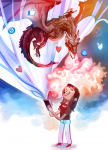This post was updated May 20 at 1:49 p.m.
“Game of Thrones,” Breaker of Records, Last of its Name.
Throughout its eight-year run, the HBO series has become heavily embedded in today’s culture, defining an era of epic, ubiquitous fantasy television. The show’s medieval influence and expansive online following skyrocketed its popularity and contributed to its impact on television that likely will be discussed for years to come.

Heroic Knights and Bloody Fights
The “Game of Thrones” reign has come to an end. But from the undying hype behind “Harry Potter” to Amazon’s upcoming “Lord of the Rings” series, the allure of medieval stories persists.
While “Game of Thrones” boasts typical elements of medievalism – towering castles, valiant knights and fire-breathing dragons – the show’s medieval influence is also notable in smaller details, said Sharon Gerstel, a Byzantine art and archaeology professor. From intricate battle strategies to house banners to food preparation, the show remains rooted in accuracy despite its more imaginative elements, she said. The story also draws from historical events such as the 15th century War of the Roses, in which the Yorks and the Lancasters fought for power, and utilizes the geography of England as a loose template for Westeros.
The show uses its medieval backdrop to comment on historical power struggles, Gerstel said, as embodied by Daenerys Targaryen, a once-naive girl who undergoes a stark personality change while fighting for the throne. “Game of Thrones” draws parallels between the power struggles of the past and power conflicts among modern political leaders, she said.
“People have drawn comparisons between the Lannisters and the Lancasters and fights over certain thrones in medieval England, but those are very loose connections,” Gerstel said. “I think that’s simply used as a lens through which to view human conflict more generally and more trans-temporally.”
It is such trans-temporality that assists medievalism in its continued media presence. Associate musicology professor and medievalist Elizabeth Upton said it creates a sense of escapism. “Game of Thrones” is underscored with fantasies of power and freedom, she said, which draw people into the fictional world. Characters like the warring queens Cersei Lannister and Daenerys, for instance, both exert control over expansive regions and thereby contribute to viewers’ innate fantasies of limitless power.
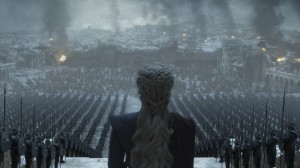
Upton said medieval rulers exercised largely unchecked control over money and resources, which is prevented by the United States’ democracy today. Kings and queens of the Middle Ages could abandon morals and social norms without consequence, which she said contributes to the intrigue surrounding medievalism.
“What would it be like if you wanted something, to just take it? What would it be like if you hated somebody, to just kill them?” Upton said. “I think that’s one of the things that makes looking at periods in the past interesting and desirable, because then you can talk about people acting on their desires … and not being constrained by modern ideas of law.”
People are also attracted to the idea of an unspoiled earth before the Industrial Revolution, Upton said. “Game of Thrones” depicts the natural beauty of the Middle Ages through imagery of the vast, snowy landscape of Winterfell and the coastal cliffs of Dragonstone – both of which are unaffected by pollution and urbanization.
The Middle Ages also presented a number of disadvantages, such as poor sanitation and lack of medicine, but Gerstel said mental time travel to the past allows people to separate themselves from today’s issues. She said people are sometimes turned off by the idea of the Middle Ages as a time of churches and religion, so shows like “Game of Thrones” – which highlight universal human struggles for power and themes of good versus evil – help bridge the gap between the present day and the past.
People’s fascination with the medieval past is largely built upon an idealized vision of adventure and heroics, Upton said. Such depictions extend beyond direct portrayals of the period, she said, with the Jedi of “Star Wars” serving as a modern interpretation of the classic medieval knight. Upton said dreams of fighting in a tournament or going on a voyage of exploration – in lieu of doing taxes or worrying about student loans – fosters a kind of group nostalgia.
“It’s not just escape from modern concerns, but also an idea where you feel that one person can have adventures and one person can make a difference in a way that just isn’t true in modern life,” Upton said. “There are people who become famous and there are people who end up having power in business … but it’s not the same as being a Jedi knight.”
Adventures in Westeros, however, are rife with cruelty, deceit and murder – a far cry from the whimsical walls of Hogwarts or the magical lands of Middle-earth. Consequently, the idea that such a bleak depiction of the Middle Ages would elicit nostalgia seems counterintuitive. Caitlin Carlos, a doctoral candidate in musicology and a nostalgia and medievalism scholar, said such nostalgia is not necessarily a longing to return to the past – it is instead a desire to make sense of modern issues using a framework from the past.
“If you focus on nostalgia as a sense of longing, it doesn’t have to be, ‘I want to live in that world, I want to escape to that world,’ it’s like, ‘I want to find something that makes sense of what I currently have,’” Carlos said.

For instance, Kersti Francis, a medievalist and doctoral candidate in English, said the wall that separates the people of Westeros from the wildlings in “Game of Thrones” can be interpreted as an allegory for immigration and Donald Trump’s wall. The fantasy lens, however, prevents the show from seeming too unabashedly political, she said. The mythical elements allow viewers to escape to a world they view as just distant enough while still encapsulating issues they can relate to, Francis said.
But most viewers still tend to perceive the Middle Ages as an unfamiliar time, Francis said, which reflects their reluctance to accept the less favorable commonalities – like physical and sexual violence – between the past and the present. The Middle Ages serve as a reflection of our modernity, Francis said, but people view it as a fun house mirror – a distorted version of modern-day society.
“We look in the mirror and we’re like, ‘Oh, that looks so weird, the Middle Ages are so weird and different.’ (But) … they’re still humans, they’re not that different from us today,” Francis said. “We’re afraid of recognizing in them what we have in ourselves.”
Francis also said people often employ their own skewed perception of the Middle Ages as overtly violent and sexual to excuse the fetishization of themes such as extreme violence in “Game of Thrones.” The show’s notorious depiction of violence includes scenes of princes having their faces smashed in and sadistic tyrants being eaten alive by hounds. The series is loosely based on the War of the Roses – meaning some of its violence is based in truth, she said.
But people like to think of the violent past as less sophisticated compared to our more civilized modern society, Francis said, even though the Middle Ages are not vastly different from today. Many viewers describe “Game of Thrones” as realistically depicting human interactions, which illustrates people’s desire – perhaps even a subconscious one – to connect the show back to modernity, Carlos said.
“We live in a world of war and violence,” Carlos said. “Seeing it in a way in which we can relate to those emotions and those instincts, but they’re fantasized in a way that’s maybe not as personal as what we experience … helps us make sense of what we have in our own world.”
The World Wide Westeros
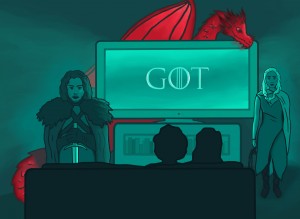
Cersei would have had to send a raven to every person in Westeros if she wanted to share a hot take on Daenerys’ claim to the throne.
In a world where Twitter is the closest alternative to bird mail, opinions online spread like wildfire. The show’s season eight premiere racked up over five million tweets when it first aired, and the show has garnered a total of over 52 million tweets in the last four months.
The season’s third episode – “The Long Night” – was tweeted about 7.8 million times, making it the most tweeted-about episode of scripted television ever. Communication professor Tim Groeling said “Game of Thrones” wouldn’t be the cultural phenomenon it is today were it not for social media communities and the internet at large.
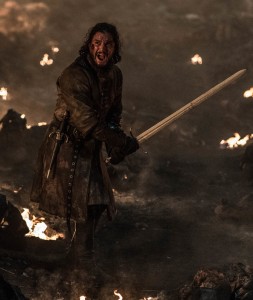
Groeling, who teaches computer-mediated communication, said social media platforms provided a space for fans to enthusiastically discuss everything about the show’s complex episodes, from the latest character death to misplaced coffee cups.
“These online communities of intensely engaged viewers being able to find each other is one of the things the internet is spectacular at,” Groeling said. “Finding somebody who is not physically near you, but who shares what you care about … can really allow a community to form around programs.”
But despite its online following, Andrew deWaard, a lecturer in the School of Theater, Film and Television, said “Game of Thrones” is not the most historically popular television show in terms of viewership. While about 17 million people watched the “Game of Thrones” season eight premiere, about 106 million people tuned into the “M*A*S*H” finale in 1983. The endings of “Seinfeld” and “Friends” also greatly surpassed that number, with about 76 million viewers and 52 million viewers, respectively.
“M*A*S*H’s” heightened viewership likely has to do with the fact that it aired prior to the streaming era, when people had to watch shows on the day and time they aired, deWaard said. But even though streaming services provide the luxury of unscheduled viewings, communication lecturer Steven Peterson said there is an element of social pressure to watch “Game of Thrones” as it airs, giving it the quality of older, prestreaming shows.
HBO’s decision to release each episode weekly – in contrast to Netflix, which releases full seasons at once – is also a callback to the older days of television that heightens anticipation and strengthens the show’s communal aspect, deWaard said. “Game of Thrones” is a prominent topic of conversation among real-world and online communities immediately following each episode’s weekly release, which encourages people to watch it the Sunday it airs, Peterson said.
“Everyone is talking about ‘Game of Thrones.’ The promotion is such that if I don’t watch it at that time then I will be outside of my social circles. I won’t be part of the in-group on Monday morning,” Peterson said. “That hearkens back to the old days … when you had one chance to watch television shows.”
Discussions on social media can either increase people’s enjoyment of “Game of Thrones” or decrease it, Groeling said, as the heavily criticized “The Long Night” proved. The season’s fourth episode, “The Last of the Starks,” and the penultimate episode, “The Bells,” also sparked outrage on Twitter, which served as a platform for fans to express their disapproval of the direwolf Ghost’s fate, as well as Daenerys’ shocking turn.
Mercedes Banwart, a third-year gender studies student and fan of the show, said polarizing episodes like “The Bells” are not enough to minimize the show’s overall impact as a pop culture phenomenon. Both well-liked episodes and controversial installments spark extensive discourse online through memes and dramatic articles, which even trickle into the social media feeds of nonviewers, she said.
“After watching the episodes, there are just piles and piles of memes to search through.” Banwart said. “You cannot go anywhere online pretty much without seeing something about ‘Game of Thrones.’”
She said the spread of “Game of Thrones” content online encourages people to watch the show just so they can participate in discussions. Whether the reactions are positive or negative, communication professor Greg Bryant said online conversations draw attention to the show. Online publications are aware of the large body of readers looking to dissect the show, he said, and the continual release of “Game of Thrones”-related content increases audience engagement.
“A lot of internet content is designed to get people to click on it, with provocative titles saying you’re gonna learn something you didn’t know,” Bryant said. “(‘Game of Thrones’) is rich with things to talk about, and there are so many different possible ways the show could go, so … it kind of affords speculation.”
However, there still remains the question of why “Game of Thrones” ratings pale in comparison to older shows like “M*A*S*H.” Because HBO is not a free viewing platform, illegal streaming is an important factor to consider. The season eight premiere of “Game of Thrones” was illegally downloaded or viewed nearly 55 million times in the first 24 hours of its release, and this number should be considered jointly with the 17 million official viewers.
DeWaard said another factor that could explain the apparent decline in viewership is the sheer number of shows being produced today. He said it is increasingly difficult for a long-term scripted show like “Game of Thrones” to grow and maintain viewership in the “Peak TV” era. With nearly 500 scripted shows produced each year – many of which have fewer episodes than “Game of Thrones” and are easier to catch up on – deWaard said it is less likely for a show to garner ratings as high as “M*A*S*H” or “Seinfeld.”
While raw viewership numbers for “Game of Thrones” may be lower, deWaard said, a strong online presence and broad audience have made the show a cultural powerhouse.
“‘Game of Thrones’ exists in so many different places, in so many types of user-generated content,” deWaard said. “People who haven’t seen it still know what’s going on, whether it’s the spoofs or satires of it or just the ways in which it will show up on ‘Saturday Night Live.’”
DeWaard also said the hundreds of characters and intricate subplots prompt elaborate fan theorizing, which also contributes to the show’s omnipresence online. Such theories often are fueled by the story’s complex lore, much of which was built by George R. R. Martin’s novels, he said.
One popular fan theory that was discussed extensively on Reddit was the idea that Jaime Lannister would kill Cersei and become the “Queenslayer” by the end of the show. Unlike completed book-to-screen adaptations such as “Lord of the Rings,” deWaard said the fact that Martin’s series is unfinished encouraged fans to formulate their own endings.
With everyone speculating, Groeling said the show is not afraid to make divisive narrative decisions that spark online discourse, like killing off a main character back in season one. Previously, when the only three channels competing for viewership were ABC, NBC and CBS, Groeling said entertainment networks were reluctant to make bold choices that could potentially alienate viewers.
But today, streaming facilitates access and serialization encourages continued viewership. Consequently, modern shows like “Game of Thrones” are less concerned with narrowing their audience, Groeling said, as those who do watch likely will watch until the end.
“You have to have a different model of viewing that isn’t based on these common-denominator mass audiences, appealing to everyone, before you can really get something that’s that in your face,” Groeling said. “Today … having an intense audience that continues to tune in is more valuable than ever.”
All Shows Must Die
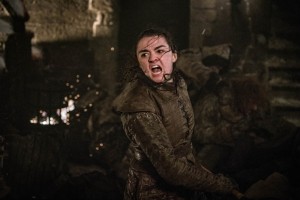
Imagine a mini “Star Wars” film to sit down to once a week, or a slightly truncated Marvel flick to cap off every Sunday night.
“Game of Thrones” provides weekly installments that rival Hollywood’s biggest hits in terms of sheer scale. Over the years, “Game of Thrones” has morphed into the epitome of blockbuster television through both its global fanbase and its budget of nearly 15 million dollars per episode. Outside of being a cultural phenomenon, “Game of Thrones” sets a precedent for what fantasy television can be. In the wake of the show’s success, Tom Nunan, a lecturer in the TFT School, said it’s healthy for showrunners of future fantasy shows to be aware of the inevitable comparisons that will be made to “Game of Thrones.”
“You want to be compared. You want to be held to a certain standard so that you can exceed that standard,” Nunan said. “‘Game of Thrones’ ultimately became such a spectacular success both critically and commercially, so it’s hard to imagine someone being able to outdo that.”
But Nunan said people also thought “The Sopranos” was unbeatable, until “Breaking Bad” – which many argue is better than the former – captured a similar audience. The same can be said for the latter and “Star Trek,” both of which were considered largely untouchable, until spin-offs “Better Call Saul” and “Star Trek: The Next Generation” respectively rivaled the quality of their predecessors. In the same vein, the planned “Game of Thrones” spinoffs have a chance of recapturing the existing show’s audience, said Alex Franklin, a lecturer in the TFT School.
But despite the franchise’s continuation, Franklin said it could be hard for anything to be compared favorably to the original show’s run, as exemplified by the “Fantastic Beasts” films – which audiences found underwhelming compared to “Harry Potter.”
Future shows will have to attract similar levels of audience and journalistic engagement to reach the same levels of popularity, Franklin said, and as of now, it’s too early to predict if that will happen. Complexity and depth are critical to heightened engagement, he said, which prevented popular-but-simplistic shows like “Modern Family” from having the same cultural impact as “Game of Thrones.”
“Whether a show will ever be as popular as ‘Game of Thrones’ is, I don’t know. But several networks, HBO included, are trying to figure out how to make their version of ‘Game of Thrones,’ or a television series that gains that kind of popularity,” Franklin said. “There’s an opening … and once ‘Game of Thrones’ is done, that audience is going to be searching for something.”
To understand how that empty space will be filled, deWaard said it is important to note that the industry shifts in waves and fads, leaning to specific content at different times. The superhero genre is one example, where Tim Burton’s 1989 “Batman” – featuring a campy, Gothic version of the character – preceded Christopher Nolan’s darker, grittier interpretation.
Today, deWaard said “The Avengers” and “Guardians of the Galaxy” are once again injecting levity into the genre. Following a similar trend, “Game of Thrones” could temporarily end the fad of dark, violent fantasy, deWaard said, with viewers seeking out shows that emphasize the lighter facets of the genre.
On the other hand, he said it is also possible the new “Lord of the Rings” series will utilize a darker, grittier tone to draw in “Game of Thrones” fans. But because Amazon does not have the same adult audience or prestige as HBO, deWaard said the new “Lord of the Rings” series likely will skew broader in its themes and narrative choices.
“The cost of fantasy necessitates a wide audience and sort of means you don’t get a specific focus on adult themes,” deWaard said. “(‘Game of Thrones’) might be pretty rare, in retrospect, for that reason.”
A more mature element that narrows the “Game of Thrones” audience is its uncompromising depiction of violence – exemplified by scenes in which a pregnant queen is stabbed to death in the stomach and a child is sacrificially burned at the stake. Although blood and gore often are considered hallmarks of the show, Nunan said it draws from the precedent set by “The Sopranos,” which featured violence more grotesquely than its contemporaries.
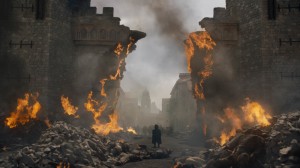
Amid the carnage are numerous references to the original book series and other fantasy series, which deWaard said is another reason for fantasy television’s success. Upcoming shows that draw from literary source material illustrate this trend, such as the new “Lord of the Rings” and HBO’s upcoming “His Dark Materials,” based on Philip Pullman’s trilogy. DeWaard said the collaborative process of analyzing shows and uncovering hidden details – like Gandalf’s sword among those that make up the Iron Throne – will encourage Hollywood to continue to produce fantasy television.
“There’s so much science fiction and fantasy that hasn’t been adapted yet, in part because past audiences were maybe not as interested in that so-called nerdy material,” deWaard said. “But now we’re 20 years into overwhelming fantasy and science fiction.”
Timing can also be impactful, Nunan said. After “Harry Potter” ended, Nunan said its audience – who had grown up alongside the series – was looking for R-rated fantasy. He said the timing of “Game of Thrones” perfectly appealed to that demographic.
Similarly, Nunan said “Game of Thrones” likely whet people’s appetite for another supernatural, immersive experience, which Amazon’s “Lord of the Rings” will take advantage of. After J. R. R. Tolkien and J. K. Rowling laid the framework for “Game of Thrones,” Nunan said showrunners David Benioff and D. B. Weiss introduced a complex fantasy world that will set the stage for future avenues of the genre.
“Here’s a fictitious community that none of us have access to, that’s akin to the middle ages … where all kinds of taboo things happen, whether it’s worlds colliding, winter coming, incest, prostitution, incredible backstabbing in search of power, and of course, to top that all off, the introduction of dragons. I don’t think that chapter has closed or ended whatsoever,” Nunan said. “I think, if anything, (‘Game of Thrones’) has kicked the door wide open.”
